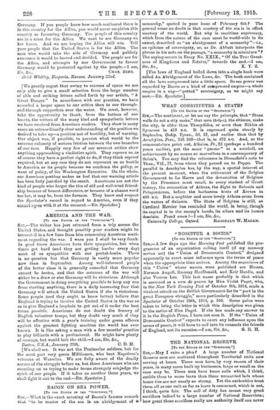WHAT CONSTITUTES A STATE?
fro sea Emma or sae "SPECTS708.°) Sra,—The sentiment, or let use say the principle, that " Stone walls do not a city make," that men (Wen), the citizens, make the city, is older than Thucydides, or even than Nikias at Syracuse in 413 B.C. It is expressed quite clearly by Sophocles, Oedip. Tyree, 58, 57, and earlier than that by Aeschylus, Pers., IA 349—that is, in 472 C.C. And, as the commentators point out, Alkaios, Fr., 22 (erhaps a hundred years earlier), put the same "gnome" in a nutshell, an achievement by no means so marvellous in a contemporary of Solon's. You may find the references in Bloomfield's note to Thee., VII., 77, from whom they passed on to Poppo. The parallel in Aeschylus has, by the way, a special interest at the present moment, when the retireineut of the Belgian Government to Le Havre and the devastation of Belgium by the Prussians must recall. to every student of Greek history, the evacuation of Athena the Bight to Salamis and Peloponnese, before the barbarous hosts of Xerxes in 480 B.C. But a mightier and more lovely Athens arose from the waters of Salamis. The State of Belgium is still, as Cardinal Mercier has reminded the world, in being, though its capital is in the enemy's hands, its altars and its homes
desolate. Prosit omen um, Sir, &a,






































 Previous page
Previous page